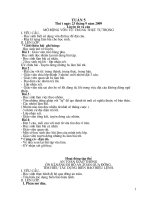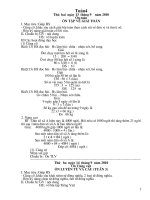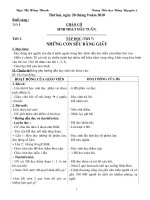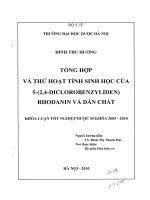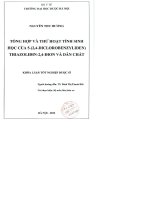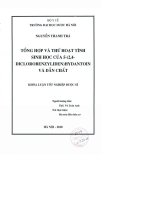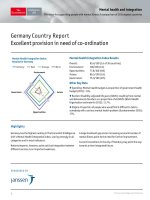5 2 4 habitats in need of help TG
Bạn đang xem bản rút gọn của tài liệu. Xem và tải ngay bản đầy đủ của tài liệu tại đây (115.75 KB, 4 trang )
5.2.4
Habitats in Need
of Help
SUMMARY
The growth of human populations
often results in greater demand for limited
natural resources and the clearing of land to
meet people’s needs. The author explains how
this trend contributes to the alarming loss of
animal habitats such as forests, prairies, and
coral reefs, and results in steeply declining
animal populations. The author also presents
stories of how people across America are fighting back by working to save animal habitats.
LESSON VOCABULARY
conservation
enthusiastic
investigation
contribute
environment
INTRODUCE THE BOOK
INTRODUCE THE TITLE AND AUTHOR
Discuss
with students the title and the author of
Habitats in Need of Help. Invite them to ask
questions about the title. What is a habitat,
and whose habitat needs help? Why? Explain
how the cover image may offer clues on how
the author will answer these questions.
BUILD BACKGROUND
Tell students that a
habitat is a place where living things can find
food, water, shelter, and nesting places. Ask
students to think about their own habitats and
those of different animals. Discuss how these
places meet the needs of living things.
PREVIEW/USE TEXT FEATURES
Ask students
to flip through the book, glancing only at
the photos. Then have them preview it
again, taking time to study the images and
accompanying captions slowly and carefully.
Discuss how this second read-through
changes their understanding of the book’s
subject.
44
FACT AND OPINION
ASK QUESTIONS
READ THE BOOK
SET PURPOSE
Have students set a purpose
for reading Habitats in Need of Help. Their
own interests in animals, as well as their
experience and knowledge of animal
habititats, should guide this purpose. How
would animals be affected by the loss of their
homes? How could this loss be prevented?
STRATEGY SUPPORT: ASK QUESTIONS
Tell
students that a good question often starts
with a question word such as who, what,
when, where, why, and how. It also asks about
an important detail of the story that can be
answered in the reading. Based on these
criteria, ask students to record questions they
have while reading about animal habitats.
COMPREHENSION QUESTIONS
PAGE 3
What are some examples of animal
habitats around the world? (oceans, rivers,
lakes, forests, deserts, and prairies)
PAGES 3 AND 7 How does the destruction of
habitats hurt animals? (Destruction prevents
animals from thriving by harming their sources
of food, water, shelter, and nesting places.)
PAGE 14
Is the author stating a fact or opinion
when she writes that the humpback whale’s
“fame comes from the dazzling leaps and
displays that it makes”? (She is stating an
opinion because it tells about her feelings and
cannot be proven true or false.)
PAGE 23 How can you tell that the author
wants to persuade readers to help animals?
(She offers specific suggestions on what
students can do to raise awareness of
endangered animals and their habitats,
such as adopting birds.)
Habitats in Need of Help
16917_LRD_TG_044-045 44
12/28/05 1:16:15 PM
REVISIT THE BOOK
READER RESPONSE
1. Possible response: Fact: Forest-clearing
has resulted in a loss of Asian elephants’
natural habitat. Opinion: The habitat of
Asian elephants deserves more protection
than other animals’ homes.
2. Answers will vary but may include forests,
swamps, and marshes; runoff from factories
and air pollution; picking up trash, recycling,
conserving water.
3. Articles will vary.
4. Students should describe how farming
destroys habitats by clearing land for crops.
EXTEND UNDERSTANDING
Tell students to look
at the photos and captions in the book. Talk
about what these images and words teach
and what questions they inspire. Then have
students use reference sources to help answer
these questions and provide more examples of
how photos and captions convey information.
Invite students to ask questions that
follow simple language patterns, such as,
“What is this?” and “What is happening here?”
while pointing to photos in the book. Have
other students answer the questions in detail.
RESPONSE OPTIONS
WRITING Invite students to create an oversized
postcard that features an animal habitat of their
choice. They should create an illustration of the
environment on one side and write a message
addressed to a friend on the other. The message
should describe why the habitat must be saved.
SCIENCE CONNECTION
Invite students to consult
reference materials for more
in-depth information on animal
habitats. Then have them use art
materials and model-making supplies to
re-create one of these habitats. Students must
be prepared to explain how their habitat’s
features help living things survive.
Skill Work
TEACH/REVIEW VOCABULARY
Help students decipher the meanings of
vocabulary words such as investigation (page
15) and conservation (page 23). Read aloud
the sentences that feature these words and
those that precede and/or follow them. Then
discuss how you would use contextual clues
to help define the words.
TARGET SKILL AND STRATEGY
FACT AND OPINION
A statement of fact
can be proven true or false by reading,
observing, or asking an expert. A statement
of opinion is a judgment or belief that
cannot be proven true or false but can
be supported or explained. Help students
make distinctions between the two types
by reading aloud statements from the book
about animal habitats. Challenge students to
identify what types of statements they are.
ASK QUESTIONS Asking questions properly
means asking good questions about
important text information. Skilled readers
ask questions before, during, and after
reading in order to activate prior knowledge,
clarify confusion, and reflect on learning. By
using this strategy, readers actively engage
with the text and remember important ideas.
Students who ask the right questions can
determine whether an author is making
statements of fact or opinion. As they read,
tell them to ask themselves if statements in
the text can be proven true or false.
ADDITIONAL SKILL INSTRUCTION
AUTHOR’S PURPOSE Tell students that the
author’s purpose is the reason or reasons
an author has for writing. Authors often have
more than one purpose for writing, such as
to persuade, inform, express, and entertain.
Ask students to share their judgments of the
author’s purpose(s) for this book by citing
the language and structure of the text.
Habitats in Need of Help
16917_LRD_TG_044-045 45
45
12/28/05 1:16:17 PM
Habitats in Need of Help
Name
Fact and Opinion
• A statement of fact can be proven true or false by reading, observing, or asking an expert.
• A statement of opinion is a judgment or belief. It cannot be proven true or false but can be
supported or explained.
Directions Read the following passage. Decide which sentences are facts and which sentences
are opinions. Then complete the chart below by listing three statements of fact and two
statements of opinion.
The habitat of orangutans is at risk of disappearing. Orangutans are large, funny-looking
apes. They live on the island of Borneo and the neighboring Indonesian island of Sumatra.
An orangutan can weigh from sixty to three hundred pounds and requires large areas of forest
in which to roam. But today, due to humans having taken over land for mining, logging, and
various types of farming, less than 20 percent of the orangutans’ original habitat remains. Some
researchers estimate that there are fewer than thirty thousand orangutans on the islands today.
Losing even one of these amazing apes would be a big tragedy.
Statements of Opinion
© Pearson Education 5
Statements of Fact
46
16917_LRD_TG_046_047 46
12/28/05 1:16:51 PM
Habitats in Need of Help
Name
Vocabulary
Directions Choose a word from the box that belongs with each group of words below.
Check the Words You Know
conservation
environment
contribute
investigation
1. surroundings
background
setting
2. examination
exploration
probe
3. donate
add
enrich
4. interested
eager
excited
5. care
saving
guarding
enthusiastic
Directions Circle the word that has the opposite meaning of the vocabulary word.
6. contribute
add
harm
enrich
7. conservation
attention
guarding
destruction
8. enthusiastic
uncaring
interested
excited
Directions Write two sentences about the loss of endangered animals’ habitats. Use as many
vocabulary words as you can.
© Pearson Education 5
9.
10.
47
16917_LRD_TG_046_047 47
3/20/06 8:56:13 AM
